Eating Pet Food For 30 Days
Dorothy Hunter, Paws Natural Pet Emporium
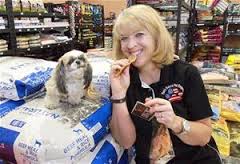 Dorothy Hunter is so confident that the food she sells in her store is healthy, that she's eating nothing but pet food for 30 days. We'll find out the inspiration for this stunt and exactly how she is faring 13 days in. So far, the only issue seems to be a mild case of flatulence.
Dorothy Hunter is so confident that the food she sells in her store is healthy, that she's eating nothing but pet food for 30 days. We'll find out the inspiration for this stunt and exactly how she is faring 13 days in. So far, the only issue seems to be a mild case of flatulence.
Dorothy Hunter is the owner of Paw's Natural Pet Emporium with stores in Richland and Kennewick, Washington. She says she doesn't sell any food sourced from China or any other non-reputable country.
The 30-days of pet food eating started when Dorothy says she was munching on some dog treats in her store, as she was too busy to run out and grab some food. Some customers then suggested she do a blog on Facebook. Dorothy said she ate nothing but dog food for a week for her customers, because she likes to do things like that, before it even made the news. She then decided to keep doing it for a month.
Dorothy wants to bring awareness to the little food companies who are going above and beyond what they have to do to make awesome pet food.
One such company is Scout & Zoe's who makes a chicken treat using USDA, Grade A, products, the same food that is supplied from the food purveyor to human restaurants. However, they are not allowed to put this information on their label, because pet laws don't allow it.
Dorothy is about halfway through her 30 days. Her main diet is Grandma Lucy's artisan chicken and organic cookies. She has also eaten Honest Kitchen's dehydrated food (Dorothy mentions the owners of this company eat their food as well).
At first, Dorothy was eating a little bit of everything in her store, but when you add very high short chain fatty acids in your system, especially when you are not used to them, you experience "gas." (We have all been told when changing your pet's diet, you should do it gradually!) Dorothy has now switched to a more dehydrated diet so she can keep working in her store and not run off her customers!
So does Dorothy add kitten milk to her coffee? She says no, she has drawn a line on the cat milk. And when asked if she likes to nibble on bully sticks, she said she is well educated on them and where they're sourced from, and where they're sourced from on the body! So, again, no!
She has drawn a line on what she will and will not eat, but on her final day and because everyone has been harassing her, she will crack open a can of green beef tripe, in beef broth, and taste it. She knows it is going to be nasty, because she says it already "smells like death" when you open it.
Don't try this at home, because as with every species (humans included) there are nutritional requirements, and eating dog food on a long-term basis is not a sound thing for humans do.
We will check in again with Dorothy at the end of her 30 days, but so far she tells us that she has no sudden desire to chase cars or sniff butts!!!
http://www.pawsnaturalpetemporium.com
"HERO PERSON OF THE WEEK" - Nicholas Nash, Nicholas' Pet Haven
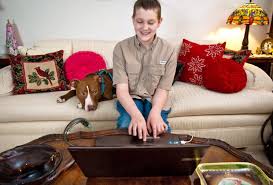 This week's Hero Person is 14 year-old Nicholas Nash. He helps find homes for adoptable animals and is building a shelter on his family land. A young person so passionate about the health and happiness of our four-legged friends - serves as a great model for future generations.
This week's Hero Person is 14 year-old Nicholas Nash. He helps find homes for adoptable animals and is building a shelter on his family land. A young person so passionate about the health and happiness of our four-legged friends - serves as a great model for future generations.
Nicholas Nash is the Founder of Nicholas' Pet Haven, a nonprofit organization that is in the process of forming a 501(c)3 corporation with the hopes of building an animal shelter. His goal in building the shelter is to save lost and found cats and dogs.
Nicholas has always loved animals and remembers his first pet as a brown lab when he was around 4 years old. Just like the rest of us, Nicholas is a foster failure. He currently took in a Pit Bull that was on death row with the idea of rehoming him, but instead decided to keep him and give him a forever home.
The idea of Nicholas' Pet Haven started when his mother's friend lost her animal. The friend gathered pictures and information on the animal and posted it on her personal Facebook page. This gave Nicholas the idea of making his own Facebook page to save other lost and found cats and dogs. To date, Nicholas has over 4,000 followers of his page.
Nicholas has been very successful in placing animals. He doesn't have an exact figure, but estimates it to be in the 100's.
Nicholas says he can't remember a time when he didn't love animals. Of course, his whole life spans 14 years, making his accomplishments all the more extraordinary. Even his friends help out and think he's cool.
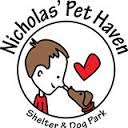 The plans for Nicholas' no-kill shelter are as a result of the land his grandmother has given to him. He plans to start soliciting donations immediately, so he can begin building as early as next year.
The plans for Nicholas' no-kill shelter are as a result of the land his grandmother has given to him. He plans to start soliciting donations immediately, so he can begin building as early as next year.
Although the family is already raising funds for the future shelter, much of the funds raised currently go to medical expenses for injured or sick stray pets.
For example, a Tyler Junior College student found a dog that had been hit by a car. It needed surgery, so Nicholas started an account on GoFundMe, which is a crowdfunding and fundraising website. He was successful and was able to raise the necessary money to pay for the surgery.
Because of all of his good work with the animals, Nicholas is being considered to appear as a guest on "The Ellen DeGeneres Show" in a segment about kids with big dreams.
Nicholas is just starting out, but projects that his shelter will be very big in the next 10 years.
So what does he want to be when he grows up? A veterinarian, of course, and work at his own shelter.
https://www.facebook.com/pages/Nicholas-Pet-Haven>

Animal Radio's HERO PEOPLE is brought to you by Zeuterin a safe, permanent and virtually painless alternative to surgical castration.
CBS's Lucky Dog
Brandon McMillan
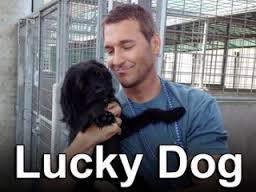 Brandon McMillan comes from a family of circus performers and is the host of CBS's new Saturday morning show, "Lucky Dog." Each week Brandon takes a shelter dog and trains them for a prospective new home. The program follows the entire process until the dog gets into his/her new forever home.
Brandon McMillan comes from a family of circus performers and is the host of CBS's new Saturday morning show, "Lucky Dog." Each week Brandon takes a shelter dog and trains them for a prospective new home. The program follows the entire process until the dog gets into his/her new forever home.
Lucky Dog is a story about second chances. Every year, all over the world, millions of dogs are euthanized because they can't find homes. That is the premise of Lucky Dog.
Every week on Lucky Dog, Brandon rescues one dog and takes it back to the Lucky Dog Ranch. Brandon then assesses and evaluates the dog to find out what he knows, and most importantly what he doesn't know.
From there, he finds a family and then trains the dog according to the family's needs. In the end, there is a union between the two, with every episode having a happy ending.
Many dogs end up back in the shelters because people select them based upon their looks. But when you rescue them, one day at a time they start showing a new "card." Next thing you know, you have this entirely different dog. This could lead to something in his past being exposed, where you will then need to train him accordingly.
When Brandon selects the dogs for his show, he looks for different breeds, different mixes and different sizes. He says that most people are under the impression that the shelters only have mixes, Pit Bulls or Chihuahuas. But in reality, shelters have many pure breeds. Brandon's focus is on breeds that many people don't realize you can find in shelters. He wants people to stop going to breeders and start going to shelters.
Born into a family of animal entertainers, where his father was a lion tamer in the circus, Brandon grew up with lions, tigers and bears in his house. He developed an attachment to animals at an early age. He jokes that he's been "picking up tiger poop" as far back as he can remember, but his early years around the animal performers certainly gave him valuable skills that he uses in his current career as a Los Angeles -based animal trainer.
Brandon has trained lions, bears, tigers, reptiles and even insects for such films as The Hangover, We Bought a Zoo, The Jungle Book II, I Am Sam, Buddy, Soul Plane, Red Dragon and television's 24, Dharma and Greg, Jackass, Wildboyz and Carnivale, plus hundreds of commercials and ads.
Brandon is also a "Shark Junkie" where he dives with sharks, cage free. "I just need the hairs on the back of my neck to stand up at least once a day," he admits. "It lets me know that I am alive and living, not just alive. There's a big difference."
http://animalexpertbrandonmcmillan.com/lucky-dog
Top 10 Bird Dangers Lurking In Your Home
Dr. Laurie Hess
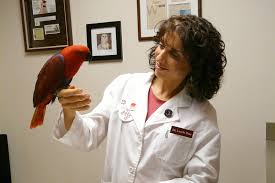 Who would've thought it could be so easy to accidentally kill your bird. If you own a bird, or maybe planning to get one, you'll need to hear the Top 10 Bird Dangers Lurking In Your Home from Dr. Laurie Hess. You might be surprised at the hazards lurking within your household.
Who would've thought it could be so easy to accidentally kill your bird. If you own a bird, or maybe planning to get one, you'll need to hear the Top 10 Bird Dangers Lurking In Your Home from Dr. Laurie Hess. You might be surprised at the hazards lurking within your household.
Be aware of these Top 10 Household Dangers for Pet Birds:
1. Fumes
Birds' respiratory tracts are much more sensitive than mammals' to airborne toxins. Teflon or any other nonstick coatings on pots, pans and kitchen appliances (such as stoves and toaster ovens) can be a cause of death in pet birds. When these coatings are heated to very high temperatures (particularly if burned), they release microscopic vapors that birds breathe in, causing fluid to collect in their lungs. Birds can die almost instantly. Other aerosols, such as cooking fumes, spray cleaners and perfumes, can irritate their respiratory passages and should always be avoided around birds. Candles also should be avoided, as some have petroleum in their wax or lead in their wicks. These toxic substances can be aerosolized and inhaled by birds.
2. Flight Danger
While birds are meant to fly, they are not meant to fly around many of the obstacles and hidden dangers in our homes. Pet birds can fly out open windows and doors or into mirrors and ceiling fans. If they land on top of doors without their owner's knowledge, when the door is slammed, they can be crushed. They can fly into hot foods and liquids (like coffee, tea and soup) and into the open flames of candles and fireplaces. They can also land on the floor, where they can be inadvertently stepped on, or in open toilet bowls, where they can drown. Flighted birds should be constantly supervised when they are out of their cages.
3. Secondhand Smoke
Birds are extremely sensitive to cigarette and cigar smoke. They can get sick not only if they breathe it in, but also if they perch on a hand or clothing that is covered with nicotine or preen the substance off their feathers. Nicotine can get on birds' feet, causing irritation. Birds who get nicotine on their feet may chew on them until they are raw and bloody. Even smokers who smoke far away from their pet birds have smoke particles on their clothing and hands that can be transferred to their birds. As a result of these potential exposures, in general, birds should live in smoke-free households.
4. Chewing
Parrots, with their sharp, strong beaks, have the natural need to chew and explore with their mouths. Wild parrots use their large pointy beaks to tear and crush food and to build nests. In our homes, however, their natural oral curiosity can get them into trouble. Birds chew electric cords, painted baseboards and window sills (which can contain lead paint or other toxins), soldered or stained glass items, galvanized wire, batteries, and other objects that contain toxic metals like lead, zinc and copper. Whenever pet birds are out of their cages, they must be watched at all times, and all potentially toxic items must be kept out of their reach.
5. Toxic Foods
Chocolate, caffeine and alcohol are known to be toxic to birds and should never be offered to them. Other toxic foods include avocado, garlic, onion and highly salty snacks. Avocado contains a substance that can cause fluid to pool in birds' hearts and lungs, and garlic and onions can lead to a fatal anemia. Ingestion of large amounts of salty treats, like chips and pretzels, can disturb a bird's fluid balance and potentially lead to cardiac problems. These foods should never be given to pet birds.
6. Human Medications
Ingestion of prescription and over-the-counter drugs for humans is the leading cause of pet poisonings, according to the American Society for Prevention of Cruelty to Animals. That problem is no less significant for birds than it is for cats, dogs and other pets. Birds love to pick up small round objects, like pills, in their mouths and can swallow them whole. Many of these medications have serious side effects in birds when they consume them at doses meant for people, and birds' rapid metabolism leaves little time to treat them. Bird owners must take extra care not to leave any medication out where a curious bird could get to it.
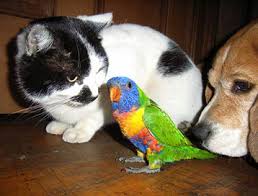 7. Other Pets
7. Other Pets
Cats and dogs are natural predators, and birds generally are prey. Dogs and cats instinctually want to run after and catch a flying or moving bird, and often, these pets go after birds with their mouths and claws. Teeth and nails can easily puncture a bird's skin, and the force of jaws grasping a bird is often enough to injure or kill a bird. Furthermore, the bacteria and other germs inside a cat or dog's mouth are foreign to a bird and, if introduced through a wound, can lead to serious and often fatal infections. Even a well-intentioned cat or dog that merely wants to pick up the bird and play with it can cause serious injury. Consequently, dogs, cats and birds should never be allowed to play together unsupervised and should never be trusted together, no matter how docile they seem.
8. Plants
Many people unknowingly bring plants into their homes that are toxic to birds. While cats and dogs often will leave plants alone, birds like to chew on plant material and will get into trouble when they decide to "taste" a household plant. Birds eat plants in the wild, so why should it be any different in a house? Some plants are merely irritating to birds when ingested, while others can cause fatal intoxication. Before bringing a plant into your home, make sure it is not potentially poisonous to pets.
9. Pest Control
Rodent traps, sticky paper and fly strips designed to catch rodents and insects are all hazardous to birds. Birds can get stuck in them or, if they eat poison bait from these traps, they can die. Even if they simply get stuck in the trap's glue, it is sometimes nearly impossible to extract them without tearing their fragile skin or ripping out their feathers. Birds should be kept far away from any baited or sticky pest traps and should be brought to a veterinarian immediately if they get entangled in one.
10. Human Germs
Birds feed other birds by chewing up food and regurgitating it to family members. This practice is safe bird-to-bird because avian family members share similar types of bacteria in their mouths and crops (the dilated pouch in their throat where they store food and start to digest it). Humans, however, have numerous bacteria, yeast and other organisms in their mouths that are very different from those of birds. In fact, many of the bacteria in humans' mouths can cause serious, potentially life-threatening infections in birds. Consequently, bird owners should never share food from their mouths with their pet birds and should be careful about using utensils that have been in their mouths to cut food for their birds.
Birds are great pets in the right circumstances. Many species can live dozens of years and are passed down from generation to generation within families. If you love your bird and want to keep him healthy and happy, don't forget to pet-proof your home so that you also keep him safe!
http://www.lauriehessdvm.com
 The Dogfather's Grooming Tip with Joey Villani
The Dogfather's Grooming Tip with Joey Villani
How to Brush An Unwilling Cat
If you have a longhaired cat that doesn't want to be brushed, is there anything you can do? The answer is yes!
There are many cats that hate to be brushed, and if you don't want to bother, you might need to go to a professional.
The problem with cats is that they don't like being approached with things. They don't like to see the brush or even those hand mitts coming at them. When they see these things coming, a red flag goes up and they run.
You need to find a mitt that is actually shaped like a glove, with fingers. They will have hard rubber bristles in the palm, allowing you to brush your cat as you stroke them.
However, there are some cats that won't even tolerate that. If they don't like it, try cutting the fingers of the mitt off, so your natural fingers are exposed. Only do this if your cat doesn't bite! (If you have a cat that bites, don't cut off the fingers, because they will attack your fingers.) This will allow the cat to see your fingers and they will respond better.
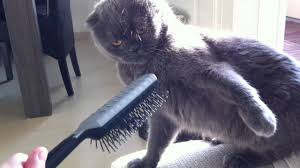 Shorthaired cats are easier if they don't like brushing. You can actually wrap gauze around the palm of your hand so your fingers are free. This way, your cat doesn't see anything. All you have to do is pet your cat normally, down their back, tail and legs. This will help remove a lot of the dead coat.
Shorthaired cats are easier if they don't like brushing. You can actually wrap gauze around the palm of your hand so your fingers are free. This way, your cat doesn't see anything. All you have to do is pet your cat normally, down their back, tail and legs. This will help remove a lot of the dead coat.
On a longhaired cat, to help with matting, go out and get some industrial strength Velcro. Make sure it is heavy duty Velcro. You will use the male portion, in other words the part that has the hard plastic grips, and wrap it around your hand. You will then use it as a brush and comb your pet. Believe it or not, you are going to get a lot more hair out of your cat than you think!
You should start working with your cat at a young age to get them used to being handled and brushed. However, there will always be the cat that still hates to be brushed. In the really hard cases, some cats may have to actually be anesthetized and possibly even shaved down.
Animal Radio® News with Tammy Trujillo
 Pet Fat Farms
Pet Fat Farms
Reports keep coming out about the problem of overweight pets and that's led to the popularity of pet fat farms offering "pawlates," "doga" and "Barko Polo," doggie versions of Pilates, yoga and Marco Polo. You wouldn't even recognize that yoga pose in the canine version. "Doga" and "pawlates" are a lot alike; both are about stretching while building strength, balance and flexibility. In "doga," stretches are close to the ground, while "pawlates" uses higher balance equipment like large exercise balls. And the "Barko Polo" pool game varies from its human inspiration: A staffer will shout "barko" and whichever dog-paddling pooch yelps first gets a toy. In the U.S., 53-percent of dogs are overweight or obese, up from 45-percent four years ago. Overweight pets can suffer from diabetes, joint problems, heart disease and decreased life expectancy, just like obese people.
Raw Pet Food Puts You and Your Dog's Health At Risk
You might think you're doing what's best for your pet if you feed them raw food, but you're actually putting their health and yours at risk. The FDA is out with warnings about raw pet food, consisting primarily of uncooked meat or poultry, organs and bones, which can carry disease-causing bacteria. Two types of bacteria are particularly dangerous to pets and people; they are salmonella and Listeria monocytogenes. People who favor raw diets for their pets point out that feral dogs and cats catch prey and eat it raw, but the FDA says there is no way of knowing how many of these animals get sick or die as a result of it. Feeding raw food to your pet also increases the risk that your pet will spread disease-causing bacteria. The FDA says that if you want to create food for your pet, you should cook raw meat and poultry to kill any harmful bacteria before you give the food to them. And if you are handling raw foods, you need to pay special attention to good hygienic practices, like washing your hands and any dishes used with the raw meats.
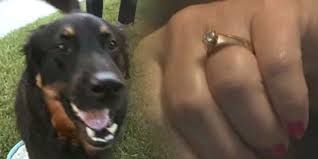 Woman Finds Wedding Ring After 6 Years Thanks To Her Dog!
Woman Finds Wedding Ring After 6 Years Thanks To Her Dog!
A woman in Wisconsin is happily wearing her wedding ring again, 6 years after it disappeared. Lois Matykowski was devastated when her ring first disappeared and even checked her dog's poop for a couple of weeks with no luck. Turns out, the ring was in the house all the time, inside the family's 10-year old Rottweiler mix, Tucker. The mystery was solved after Tucker recently ate a Popsicle, stick and all. Their vet told them to feed Tucker some Vaseline between two slices of bread. He coughed up the stick, but two days later was sick again. He threw up and yes, you guessed it, there was the ring. The vet thinks the Popsicle stick dislodged the ring from wherever it was in Tucker's stomach. Lois says a quick cleanup with a toothbrush and toothpaste and s the ring looked exactly like it did some six years ago.
Another App To Help Find A Lost Pet
The ASPCA has just released its first app designed to help pet parents locate Fido as quickly as possible. What makes this one different is that instead of simply adding photos of their lost pets to a database where it could get lost in all the other pictures of lost pets, the ASPCA app gives you an individual search plan with customized action steps based on their pet's unique personality and the circumstances of how they were lost. Medical records and photos can be uploaded onto the app to create a digital "lost pet" flyer that can be shared across social media networks in the event of an emergency. The ASPCA did a study during the creation of the app that found that 58-percent of lost pets were recovered through some action taken by owners or others, including using ID tags and microchips, searching the neighborhood, checking with local shelters or animal control and distributing flyers or posters.
 Communal Dog
Communal Dog
Next time you're apartment hunting, you may want to add "communal dog" to your checklist. One new apartment complex in Washington D.C. comes with an English Bulldog for all residents to enjoy. The manager of 2M, Doug Crawford, is making it possible for busy residents to have a pet without all the work. His 10-month-old pup, Emmy, will serve as the communal dog. People who live in the building will be able to visit and interact with the dog seven days a week, but Crawford will take full care of Emmy.
Flea & Tick Guideline Update
Fleas and ticks are most active this time of year, so the FDA has updated its guidelines for using flea and tick control products. There are two pieces of advice that are pretty important. The FDA says don't go "off-label" when treating your pets, and always consult your veterinarian when beginning or changing treatment.
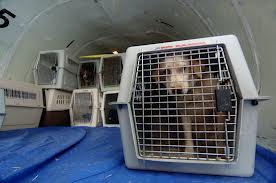 Airlines Now Have To Report Animals That Were Lost, Injured or Died
Airlines Now Have To Report Animals That Were Lost, Injured or Died
We've probably all heard horror stories about what can happen when a pet travels by air. Now, you can be better informed when choosing an airline when traveling with your pet. The U-S Transportation Department has changed it's rules, expanding the number of U-S airlines that have to report on animals that were lost, injured or died during transport. Up until now only 14 had to do it, but starting January 1st, 27 have to file the reports and that pulls in some of the smaller carriers. And for the first time, the rule will have to apply to shipments by breeders, not just pet owners. Animal rights groups had wanted animals other than just cats and dogs to be covered by the requirements, but the department said that would be too much to do. Government figures show 122 dogs died between May 2005 and May of 2010 while being transported by their owners as cargo. Short-faced breeds like bulldogs and pugs accounted for nearly half of those, possibly because of the heat in the cargo hold.
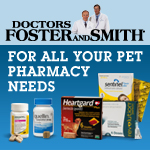
NEWS UPDATE brought to you by Drs. Foster & Smith, affordable pet supplies. Low prices every day, so you save on every order.
 Listen to the entire Podcast of this show (#763)
Listen to the entire Podcast of this show (#763)



 Dorothy Hunter is so confident that the food she sells in her store is healthy, that she's eating nothing but pet food for 30 days. We'll find out the inspiration for this stunt and exactly how she is faring 13 days in. So far, the only issue seems to be a mild case of flatulence.
Dorothy Hunter is so confident that the food she sells in her store is healthy, that she's eating nothing but pet food for 30 days. We'll find out the inspiration for this stunt and exactly how she is faring 13 days in. So far, the only issue seems to be a mild case of flatulence. This week's Hero Person is 14 year-old Nicholas Nash. He helps find homes for adoptable animals and is building a shelter on his family land. A young person so passionate about the health and happiness of our four-legged friends - serves as a great model for future generations.
This week's Hero Person is 14 year-old Nicholas Nash. He helps find homes for adoptable animals and is building a shelter on his family land. A young person so passionate about the health and happiness of our four-legged friends - serves as a great model for future generations. The plans for Nicholas' no-kill shelter are as a result of the land his grandmother has given to him. He plans to start soliciting donations immediately, so he can begin building as early as next year.
The plans for Nicholas' no-kill shelter are as a result of the land his grandmother has given to him. He plans to start soliciting donations immediately, so he can begin building as early as next year. Brandon McMillan comes from a family of circus performers and is the host of CBS's new Saturday morning show, "Lucky Dog." Each week Brandon takes a shelter dog and trains them for a prospective new home. The program follows the entire process until the dog gets into his/her new forever home.
Brandon McMillan comes from a family of circus performers and is the host of CBS's new Saturday morning show, "Lucky Dog." Each week Brandon takes a shelter dog and trains them for a prospective new home. The program follows the entire process until the dog gets into his/her new forever home. Who would've thought it could be so easy to accidentally kill your bird. If you own a bird, or maybe planning to get one, you'll need to hear the Top 10 Bird Dangers Lurking In Your Home from Dr. Laurie Hess. You might be surprised at the hazards lurking within your household.
Who would've thought it could be so easy to accidentally kill your bird. If you own a bird, or maybe planning to get one, you'll need to hear the Top 10 Bird Dangers Lurking In Your Home from Dr. Laurie Hess. You might be surprised at the hazards lurking within your household. 7. Other Pets
7. Other Pets
 The Dogfather's Grooming Tip with
The Dogfather's Grooming Tip with  Pet Fat Farms
Pet Fat Farms
 Communal Dog
Communal Dog
 Airlines Now Have To Report Animals That Were Lost, Injured or Died
Airlines Now Have To Report Animals That Were Lost, Injured or Died
